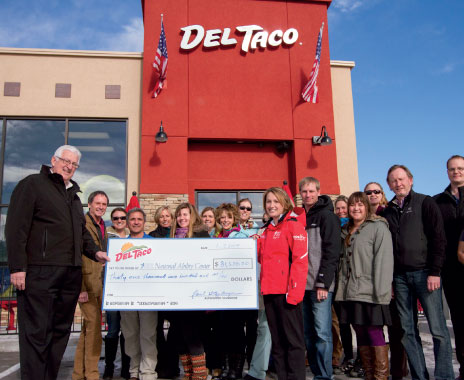Del Taco franchisee Paul Hitzelberger has been on either side of the franchise aisle, having previously served as a member of the brand’s corporate team. The president and CEO of Utah Del Taco believes that franchisees and franchisors have a responsibility to work together in giving back to their communities.
Hitzelberger has been doing just that at his 26 Del Taco units, using charitable giving and good deeds to support his customer base.
“A lot of our attitude goes back to my upbringing in Chicago—very neighborhood-oriented, helping each other, and doing the right thing,” Hitzelberger says. “Our focus has been [finding] the needs in each of the neighborhoods that we’re in and doing that right thing, something that is comfortable, positive for what that need is, and reflects positively on the brand.”
After serving as chief marketing officer at Del Taco between 1986 and 2001, Hitzelberger began his “retirement,” which included buying eight restaurants in Utah, Del Taco’s worst-performing area, and turning the stores around. Now the stores he manages with his wife, Jane, are successful, which allows the couple to invest in community-building initiatives.
“We want to be a good neighbor and help out with what those neighborhood needs are throughout Utah,” Hitzelberger says. “Utah is very family-oriented, and that brings out needs with kids and needs with families.”
In the quick-service industry, there are philanthropic programs run across an entire system, as well as programs designed at the franchisee level. For the Utah Del Taco stores, it’s a little bit of both. Hitzelberger credits the parent company for providing a lot of “neighborhood marketing” programs, which he says he was involved in developing during his corporate years.
According to Del Taco corporate, the company provides its franchisees with the support and tools they need to succeed in their charity efforts. These resources include local store marketing programs, operational support, and comprehensive training.
Keith Gerson, president of FranConnect, a franchise management system based in Reston, Virginia, says it is key for operators to support the communities that support them. As such, franchisors must be able to support their franchisees in doing the hands-on work involved with charitable giving.
“In a franchise organization … it’s supposed to be about a branding consistency from location to location. It’s very difficult to win at the local level if the chain is losing at the national level,” Gerson says. “There has to be direct alignment between the franchisee and the franchisor, and I think some brands have really figured that out. Sometimes it takes finding that one thing that everyone can align with and are passionate about.”
The Utah Del Taco units have several community-focused charitable interests. Three of the biggest are the Utah National Guard Charitable Trust, which helps Utah military families; the National Ability Center, which provides athletic opportunities to children and adults who have orthopedic, spinal cord, and neuromuscular injuries; and the Madeleine Choir School, whose young members have traveled to Europe and sung with the Mormon Tabernacle Choir.
Hitzelberger is passionate about his involvement with each organization and strives to connect his employees with their respective causes. “Each time we do fundraising for the National Guard and the National Ability Center, we do a kickoff with our management team where representatives from each charity tell their story and what their needs are,” he says.
Last year the National Guard brought in a family who had benefited from the trust while the father was deployed. The National Ability Center brought in a woman named Allie who has been in a wheelchair since childhood. She spoke about how the NAC has helped her have a more normal life, including being a receptionist for the NAC.
Hitzelberger recalls that the Utah National Guard Charitable Trust was the first organization that had a big impact on him during his franchisee tenure. While in Draper, Utah, for a store opening, Hitzelberger visited a National Guard base, where he talked about the challenges service members and their families face. He learned that military and government funding sometimes fell short; for example, spouses often didn’t have the funds to visit injured service members at Walter Reed National Military Medical Center.
“Now whenever we open up a restaurant, we invite the neighboring base to our opening, and they can have anything they want to eat, on me,” Hitzelberger says.
The Utah Del Tacos also host “Taco Talks,” which are conducted by the general managers in each restaurant. Every person who donates to a particular cause gets his or her name placed on a large card and hung on the walls of the restaurant by the employees.
Bruce Burtch, industry consultant and author of Win-Win for the Greater Good, says franchisees can benefit from developing programs in conjunction with their franchisors.
“If what you want to do in your community will meet your personal and business objectives of being a good citizen … then I think that it’s stronger because then you can leverage the national advertising, the national spokespeople, and the national impact on a local basis,” he says.
Hitzelberger always loved working the philanthropic side of the business when he was with Del Taco corporate. And now he’s able to do the same as a ground-level franchisee.
“I’ve been nearly 30 years with the brand,” he says. “We want to do the right thing in each neighborhood, and I think that’s a great formula.”





